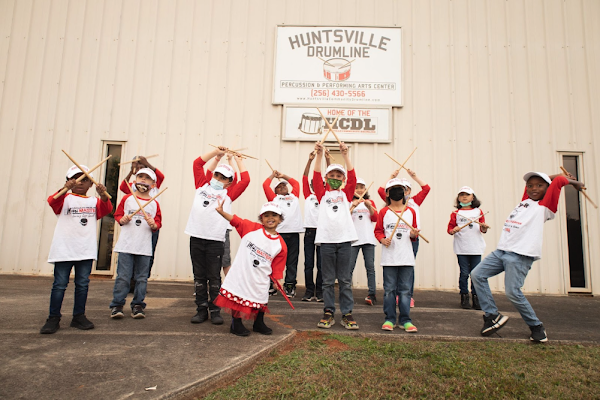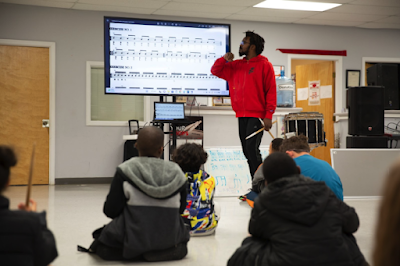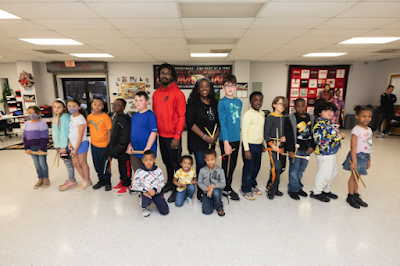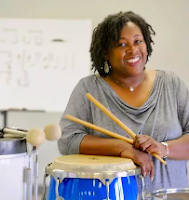Today, we’re introducing you to one of our Community Foundation of Huntsville’s Digital Inclusion Fund grant recipients, Huntsville Community Drumline, a tuition-free, non-profit percussion instruction organization based in Huntsville, Alabama where they teach life skills through drumming. Angela L. Wilson-Walker, CEO & Founder, shares how the i.D.R.U.M. (or Digitally Responsible Unstoppable Musicians) program is breaking barriers in STEAM learning for local youth.
At Huntsville Community Drumline (HCDL), our mission is to empower youth to become productive and contributing members of our society — drums are just the tools we use. If our students decide not to become drummers, that’s ok with us. We ultimately want them to learn teamwork, self-discipline, respect for themselves and respect for others. But before we talk about what we do, it’s fundamental to understand how Huntsville Community Drumline came to be.

Before I founded HCDL in 2010, there were three paths simultaneously converging in my life.
Path #1
I was the coordinator of an amazing drumline at my church. As the drumline experienced exponential growth, I saw the impact that it had on the youth that were involved and the impact that it had on the youth in the audiences where the drumline performed. We would be invited to events and the children in the audiences were intrigued by the drums. They were especially fascinated to see children that looked like them and were the same age as them performing on the drumline.
I decided that I wanted to branch out into the community. I wanted to invite children and youth of all ages, and socioeconomic backgrounds to experience what it was like to be a part of a marching drumline without church membership requirements.
Path #2
Many years ago I read an article about the tragic story of 14 year old Martin Lee Anderson. In 2006 he was arrested for stealing his grandmother’s car, curfew violation and for stealing candy. He was sentenced to 6 months in the Bay County boot camp in Panama City. After being forced to run drills on his first day at the camp, Martin collapsed and died. His devastating death brought national attention. The NAACP, the Black Caucus, and the Department of Justice called for investigations. Civil rights complaints were filed and thousands of college students marched on the state capital demanding justice for Martin Lee Anderson. The camp was eventually closed.
I remember seeing the outrage and the demands for justice for this young man, and I couldn’t help thinking, where was the justice for him before he died? What if there had been systems and programs in place designed to keep him involved in positive activities and off the streets—what if thousands of college students had intervened in his life prior to him being sent to that bootcamp? These were burning, unanswered, heartbreaking “what if” questions that remained with me for many years.

Path #3
After graduating high school my son, a phenomenal musician and life-long drummer, decided that he didn’t want to attend college. He told me that he would rather sit on the side of the road with a cup and a sign that read ‘will work for food’ than ever take another math class.

Frederick Walker - Photo Credit: Dokk Savage
I knew the statistics of young Black men without a college degree and I didn’t want him to fall victim to a deeply flawed system — I knew I needed to step in.
So at the intersection of these three transformative paths, I stepped out on faith, took a significant investment risk, used my son’s college fund, my savings, my retirement, borrowed money from family, close friends and I bought an 8,700 sq. ft., half-million dollar building. It was there that the Huntsville Community Drumline had its very loud and humble beginnings.
Today we’re nearly 13 years strong and have taught more than 5,000 youth and children in Huntsville and surrounding areas to play the drums — all tuition-free.

Photo Credit: Andrew Wolfe
Just one of our many programs, i.D.R.U.M. (or Digitally Responsible, Unstoppable Musicians) is our latest initiative. We refer to these students as the “Mix-masters”!
This program is focused on developing digital literacy beyond gaming and social media through music and video production. i.D.R.U.M. instructor, multi-platinum music producer Craig Stevens of Groovetime Music has worked with some of the biggest names in the business and is now teaching HCDL youth new skills such as composing, mixing, and mastering Music.

Photo Credit: Sweet Gap Photography
Google Fiber's Digital Inclusion grant, administered through the Community Foundation of Greater Huntsville, made this possible. When we received the grant, I immediately reached out to Craig, who had been a long time HCDL supporter. He did an amazing job of getting our iDRUM initiative off the ground. The following year I applied for the grant again, and this time with Craig’s input, the grant award was doubled. With the additional funding we were able to scale the program, add more stations, a server, more equipment and stations for video production. We were also able to move from our original space in the building and we’ve created a computer lab with studio space.

Thirteen years ago, I had no idea that the three converging paths would lead me on this very loud journey. At times I faced uncertainty and I wondered if I would be able to continue. I remember being asked by a potential donor, “Are you sustainable?” I knew that what he meant was, “Is the organization sustainable?” I knew that the real question was, “Are these kids sustainable?” And this, to me, was a simple answer of yes.

Photo Credit: Sweet Gap Photography
Each day, I get to watch children flourish, grow, learn, all while becoming amazing gifted and talented musicians. Then I get to hear about them continuing to progress and develop into productive humans.
I can officially look back and say God has smiled on me! I know it had to have been through Divine intervention that those converging events in my life made me create something I never imagined or thought possible. We continue to be connected with supportive individuals and organizations. We live in a wonderful community that loves HCDL and funding opportunities like the Google Fiber grant have all helped to make this loud journey possible.
Oh and by the way, my son Frederick, who is HCDL’s creative director and lead instructor, is now a college graduate. But that’s another story for another blog…
Posted by Angela L. Wilson-Walker, CEO & Founder
